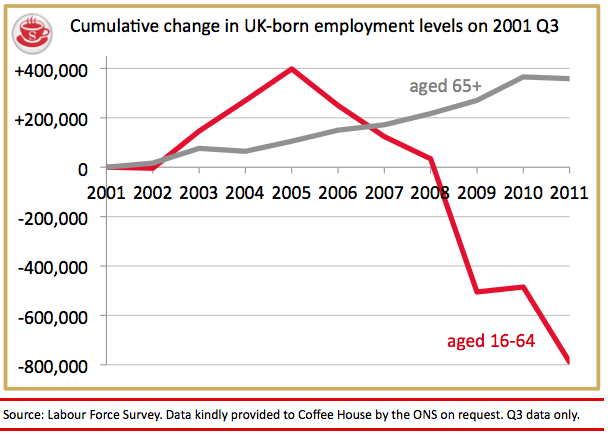Are pensioners doing their bit for the recovery? The agenda of ‘intergenerational fairness’ has arisen in response to the idea that they are not, and ought to be taxed more. Daniel Knowles has made the case, in our cover story this week. Carol Sarler responds to him. In the leader, we reveal some data hitherto undisclosed: the way the oldies are responding to the recession. They’re working as never before — the below graph shows (stripping out foreign-born workers) the change over the past decade:
Between 2001 and 2011, all the employment increase for UK-born people was from pension-aged workers, while working-age employment dropped. This challenges the idea of the over-65s as a burden on the rest of society. The changing face of Britain’s workforce has not just meant Polish plumbers but cheery pensioners behind Tesco tills. QE has raided £270 billion from pensions funds and the inflation it has stoked has decimated purchasing power. So, yes, the oldies have felt unacknowledged pain. But the over-65s are doing their bit for the recovery too: thanks to them and the immigrants, employment has risen.
This poses a challenge to Keynesians. As Casey Mulligan, the brilliant Chicago Uni economics professor, has said, the Keynesians say the problem is a lack of supply of jobs. In which case, a downturn should affect all age groups. But since the crash, look at the divergence in Britain:

So why has the employment of the oldies gone up, and the young-uns gone down? A variety of factors will be in play, but one is that the oldies pay lower rates of tax thanks to a greater tax-free threshold, and so have a greater incentive to work. Osborne might well have ‘simplified’ the tax structure by giving this incentive to the working-age too — rather than trying to increase the tax burden on the old. The dynamic effects can be remarkable, as the Swedes have found.
The trajectory of the recovery here and abroad throws up interesting lessons, and confounds the rather simplistic Keynseian model. But when it’s argued that the over-65s are a burden to be shouldered, it’s worth bearing in mind that the retired have never been working harder.







Comments